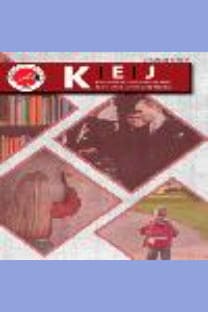OKULDA VE OKUL DIŞINDA BİLGİ VE İLETİŞİM TEKNOLOJİLERİNİN KULLANIMININ ÖĞRENCİLERİN PISA 2012 PERFORMANSIYLA İLİŞKİSİNİN İNCELENMESİ
Bu çalışmanın amacı, PISA 2012 uygulamasına katılmış 8. sınıf Türk öğrencilerinin matematik, fen ve okuma performanslarının, okul içinde ve dışında bilgi ve iletişim teknolojileri (BİT) kullanımıyla ilişkisini aşamalı doğrusal modelleme yoluyla ortaya koymaktır. Araştırmanın örneklemini PISA 2012 uygulamasına katılmış 4848 öğrenci oluşturmaktadır. Araştırmada, matematik, fen ve okuma alanları bilişsel alan başarı testleri ve öğrenci BİT anketi aracılığı ile toplanan verilerden yararlanılmıştır. Veriler çok boyutlu modellemeyle analiz edilmiştir. Öğrencinin matematik, fen ve okuma performansındaki değişimin küçük ama anlamlı bir kısmı BİT’e dayalı değişkenlerce açıklamaktadır. Öğrencinin okul içerisinde bilgisayarı okul görevlerini yerine getirmek için kullanması ilgili bağımlı değişkenlerle negatif ilişki gösterirken, öğrencinin bilgisayarın yanı sıra diğer iletişim teknolojileri kullanması pozitif ilişki göstermektedir. Ayrıca öğrencinin okul dışında interneti eğlence amaçlı kullanma sıklığı fen ve matematik alanları için öğrenci performansını artırmaktadır.
Anahtar Kelimeler:
BIT, matematik performansı, fen performansı, okuma performansı, PISA 2012, aşamalı doğrusal modeller
An Examination Of The Relationship Between Information Communication Technology At School Or Outside Of School And Student’s Performance In Pisa 2012
The purpose of this study is to determine the relationship between home and school related ICT variables and student’s performance at math, science and reading in PISA 2012. The sample of the study is composed of 4848 Turkish students. Existing data were used from PISA 2012 and they were obtained from cognitive domains (math, science and reading) tests and ICT survey. Hierarchical linear models were used as a data analysis method. The findings of the study demonstrated that ICT variables explained significantly small variance at math, science and reading performances. There was a significant negative relationship between student’s performances and using computer for school tasks at school. Despite this negative relationship, the result also showed that if student has and uses other educational technologies such as laptop, printer and internet frequently in school, his performances will increase. Also using computer for entertainment at home has a positive impact on student’s math and science performance
Keywords:
ICT, math performance, science performance and reading performance, PISA 2012, Hierarchical linear models,
___
- Banerjee, A., S. Cole, E. Duflo, and L. Linden, (2007). Remedying Education: Evidence from Two Randomized Experiments in India. Quarterly Journal of Economics, 122, 1235-1264.
- Becker, H. (2000). Pedagogical Motivations For Pupil Computer Use That Lead To Student Enga- gement.Educational Technology, 40 (5), 5-17.
- James, R., & Lamb, C. (2000). Integrating science, mathematics and technology in middle scho- ol technology-rich environments: A study of implementation and change. School Science and Mathematics, 100, 27-36.
- Jonassen,D. H., Campbell, J. P., and Davidson, M. E. (1994). Learning with media: Restructuring the debate. Educational Technology, Research, and Development, 42, 31–39.
- Ma, X. (2001). Health outcomes of elementary school students in New Brunswick: The education perspective. Evaluation Review, 24, 435– 456.
- OECD (2013). PISA 2012 Assessment and Analytical Framework: Mathematics, Reading, Science, Problem Solving and Financial Literacy, OECD Publishing.
- Organization for Economic Cooperation and Development. (OECD). (2012). PISA 2009 Tech- nical Report, PISA, OECD Publishing. Web:http://www.oecd.org/document/19/0,3746, en_2649_35845621_48577747_1_1_1_1,00.html adresinden 19 Ekim 2011’de alınmıştır.
- Papanastasiou, E. (2002). Factors That Differentiate Mathematicsstudents in Cyprus, Hong Kong, and the USA. Educational Research and Evaluation, 8,129–146.
- Ravitz, J., Mergendoller, J., and Rush,W. (2002, April). Cautionary Tales About Correlations Bet- ween Student Computer Use And Academic Achievement. Paper Presented at Annual Meeting of the American Educational Research Association, New Orleans, LA.
- Saka, A. Z. ve Yılmaz, M. (2005). Bilgisayar Destekli Fizik Öğretiminde Çalışma Yapraklarına Dayalı Materyal Geliştirme Ve Uygulama. The Turkish Online Journal of Educational Techno- logy –TOJET. 4(3),
- Shaikh, Z., A., & Khoja, S. A. (2011). Role of ICT in Shaping The Future of Pakistani Higher Edu- cation System. The Turkish Online Journal of Educational Technology, 10(1), 149-161.
- Song, H., and Kang, T. (2012). Evaluating the Impacts of CT Use: A Multi-Level Analysis with Hierarchical Linear Modeling. Turkish Online Journal of Educational Technology - TOJET, 11(4),132-140.
- Subrahmanyam K, Kraut RE, Greenfield PM, Gross EF. (2000). The İmpact Ofhome Computer Use on Children’s Activities and Development. Future Child. 10,123–144.
- Weaver, G. C. (2000). An Examination Of The National Educational Longitudinal Study (NELS: 88) Database To Probe The Correlation Between Computer Use İn School And İmprovement in Test Scores. Journal of Science Education and Technology, 9, 121-133.
- Wenglinski, H. (1998). Does İt Compute? The Relationship Between Educational Technology and Student Achievement in Mathematics. Princeton, NJ: Educational Testing Service.
- Yusuf, M. O., & Afolabi, A. O. (2010). Effects Of Computer Assisted İnstruction (Cai) On Se- condary School Students’ Performance in Biology. The Turkish Online Journal of Educational Technology, 9(1), 62-69.
- ISSN: 1300-8811
- Yayın Aralığı: Yılda 4 Sayı
- Başlangıç: 1992
- Yayıncı: -
Sayıdaki Diğer Makaleler
AÇIK LİDERLİK ÖLÇEĞİNİN GELİŞTİRİLMESİ
Açık Liderlik Ölçeğinin GELİŞTİRİLMESİ, Murat POLAT, İmam Bakır ARABACI
İKİ DİLLİ ÖĞRETMEN ADAYLARININ EK VE FİİLLERİ DOĞRU KULLANABİLME BECERİLERİNİN ÖLÇÜLMESİ
ÖĞRETMEN GÖRÜŞLERİNE GÖRE İLKOKULLARDA YÖNETİCİLERİN KAYIRMACILIK DAVRANIŞLARI
Ünal ÇAKIROĞLU, Mücahit ÖZTÜRK
Safiye Bilican DEMİR, Özen YILDIRIM
Their Professional LİFE, Sait ÇÜM, Nuri DOĞAN
Tarih Öğretiminde Tarih Dizilerinin Kullanımına İlişkin Öğrenci Görüşleri-Nitel Bir Analiz-
Bilimin Doğasıyla İlgili 1998-2012 Yılları Arasında Türkiye’de Yapılan Çalışmaların Değerlendirmesi
Eda ERDAŞ, Nihal DOĞAN, Serhat İREZ
DRAMA YÖNTEMİYLE TOPLAMA İŞLEMİ: İLKOKUL BİRİNCİ SINIF ÖĞRENCİLERİNDEN YANSIMALAR
